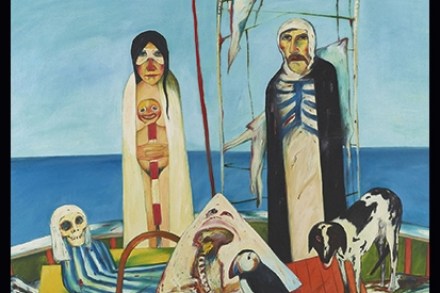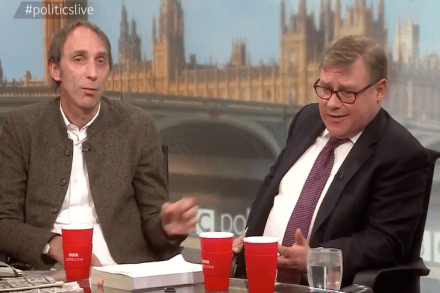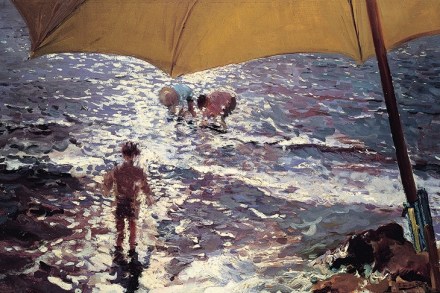Books and Arts – 14 March 2019

The good, bad and ugly in arts and exhbitions
Halfway through the first part of Channel 4’s extraordinary documentary Leaving Neverland (Thursdays), I flicked through the comments on social media in order to gauge the global reaction. Surely, I thought, Michael Jackson’s reputation will never recover from these bombshell revelations. If you sat, squirming, though Dan Reed’s excruciatingly prurient documentary you’ll know what I mean. Lots of those who didn’t have been justifying their decision to ignore it with excuses like ‘Yeah, but we knew this already. Michael Jackson was a paedo. It’s hardly news, is it?’ But this strikes me as glib and dishonest. Sure, Wacko’s fondness for prepubescent boys — such as Jimmy Safechuck, the ten-year-old Australian


Nicholas Hytner’s new show, Alys, Always, is based on a Harriet Lane novel that carries a strong echo of Brideshead. A well-educated journalist, Frances, becomes entangled with the wealthy Kyte family (the closeness to ‘Flyte’ is doubtless intentional), and she befriends the silly daughter, Polly, before setting her sights on the enigmatic father, Laurence, a famous scribbler who never gives interviews. This slow-moving tale is intercut with scenes from Frances’s day job at a failing newspaper where the staff keep getting the boot. But Frances, mystifyingly, retains her post. How come? Floppiness is her most conspicuous quality. She’s a watchful sponge with no wit, charm or intellect, and for most

Operas are like buses. Both are filled with pensioners and take ages to get anywhere, but more importantly they always seem to arrive en masse. You wait ages for a Magic Flute, then five come along at once. Opera North started us off in January, Welsh National Opera and English National Opera are currently following suit, with Scottish Opera and Glyndebourne covering the summer shift. It’s a mess and, when you consider that at least four of these are touring with inevitable overlap, a wanton, self-destructive splitting of an already small opera-going audience. With more Flutes than a school wind-band to choose from this season you can afford to be

Blame Kenneth MacMillan. The great Royal Ballet choreographer of the 1960s, 70s and 80s was convinced that narrative dance could and should extend its reach beyond boy meets sylph and began wrestling with heavyweight essay subjects such as the fall of the Austro-Hungarian empire (Mayerling) or the last of the Romanovs (Anastasia). And now look: Queen Victoria, the pointe shoe years, a bold, good-looking ballet that almost triumphs over the absurdity of its premise. Cathy Marston’s latest work for Northern Ballet follows the success of her 2016 Jane Eyre, a spare, clever reworking of the novel that will be danced by American Ballet Theatre in New York this June. Victoria,

Choreographer Richard Alston is now 70 and his latest outing at Sadler’s Wells is a greatest hits medley. As with all clip shows, some of it is super, some soporific and some merely meh. We begin with Martin Lawrance’s Detour, first performed last year. The piece is a powerful hybrid of fluid dance and martial arts: kung fu meets pas de deux. The raking lamps by designer Zeynep Kepekli spotlight dancers in washed indigo and ochre tunics. The final image of a male dancer spinning his female partner like a storm-warning weather vane is striking. The trouble with minimalist soundscapes (very Tubular Bells) is that unless the dancers control both

It’s not surprising given the way that electronic communication has taken over so much of our daily business, minimising human contact wherever possible, that podcasting (or what might be called aural blogging) has taken off in such a big way, anything from Griefcast to Love + Radio via The Breakup Monologues and To the Woman. We crave the sound of a human voice talking to us and no one else, and even better when it comes in disembodied form, stripped of all physical expression. This intense aural connection has been radio’s chief selling point since the 1920s, technology enhancing human interaction, the need to tell and listen to stories. Don
It’s something of an understatement to say that Brexit has incited passions in the past two years, even on live TV. But today Mr S thinks we came the closest we’ve seen yet to a full on fight breaking out in the studio, between the author Will Self and the Brexiteer MP Mark Francois on Politics Live. The argument began when Self made the rather inflammatory suggestion that: ‘Your problem really Mark is not that you have to be a racist or an anti-Semite to vote for Brexit, it’s just that every racist and anti-Semite in the country did.’ In response, Francois called for Self to ‘apologise on national television’ for

Artists can be trained, but they are formed by their earliest impressions: a child of five may not be able to draw like a master but he can see better and more intensely. The light of Valencia was burnt into Joaquin Sorolla y Bastida’s mental retina and he could not get it out of his mind: ‘I live here like an orange tree surrounded by heaters,’ he told an interviewer in Madrid in 1913. Never a studio painter, he worked best under the lamp of his native sun and returned to Valencia from wherever he was living every summer to set up his easel on the beach. His ambition was

Russian Doll is a brilliant new Netflix drama in which a woman relives the same night over and over again. It is particularly enjoyable for me to watch because I feel like that is exactly what I am going through. The same problems present and re-present themselves, quite as though I never come to grips with them, when in reality I do nothing but try to come to grips with them. In Russian Doll, a New York software engineer called Nadia Vulvokov (‘It’s like Volvo only longer,’ she pleads) finds herself reliving her 36th birthday party in an ongoing time loop wherein she repeatedly dies horribly in a violent accident


If you want to lose friends and alienate people in the art world, try telling them you support Britain leaving the EU. As someone on the left, I’ve always argued a left-wing case for leaving. It is, to say the least, an unfashionable position, usually met with anxious looks, sullen silence or overt hostility from one or other artist, curator or art bureaucrat. That the art world should be against Brexit should come as little surprise. It’s striking, however, how far art has become involved in the burning political questions and controversies of the moment, to the extent that making art is often seen as nothing more than an extension


Captain Marvel is the 654th film in the Marvel franchise — the figure is something like that, I think — and as the first one to be female-led it was mercilessly trolled before its release by the fan boys. ‘This movie is gonna bomb like no other and they only have themselves to blame,’ was one typical remark. The nastiness escalated further when the film’s star, Brie Larson, said she was sick of being interviewed by ‘white dudes’ while doing promotion and asked why so many film critics are white and male. (78 per cent are, according to the latest research.) I don’t know why I’m telling you all this

BBC2’s MotherFatherSon announced its status as a classy thriller in the traditional way: by ensuring that for quite a long time we had no idea what was going on. At first it looked as if the focus would be on a missing teenager whose phone we saw abandoned in the woods. But then we cut to an American called Max (Richard Gere, no less) arriving in London by private jet on an apparent mission to choose our next prime minister. Then to a younger man running fast and screaming. Then to a veteran female journalist being sacked — and not only because she’d just lit a cigarette at her desk.

Jesus Hopped the ‘A’ Train by Stephen Adly Guirgis deserves its classic status. This wordy and highly cerebral play pulls off an extraordinary feat by leading the spectator inside the mind of a psychopath. The setting is Rikers Island, where an old lag, Lucius, befriends a younger detainee, Angel, who hopes to be acquitted of killing a pastor whom he shot in the buttocks. (The bullet-in-the-bottom detail is typical of Adly Guirgis’s macabre frivolity.) Lucius is a chain-smoking fitness freak who keeps himself in trim by jogging on the spot and performing bursts of press-ups in his cell. We first meet him as the victim of petty bullying by a
‘Those who can, do; those who can’t, teach.’ If there’s an exception to prove Shaw’s rule, it’s Phyllida Barlow. The 40 years the sculptor spent teaching at the Slade, where her pupils included Rachel Whiteread, have not only left her creative energies intact, but completely failed to keep a lid on them. After turning Tate Britain’s Duveen Galleries into a cross between a lumberyard and an enchanted forest in 2014, then filling the British Pavilion to bursting point at the 2017 Venice Biennale, the septuagenarian who can conjure a sculptural wonderland from the contents of your local branch of Travis Perkins has been let loose on the Royal Academy’s Gabrielle

According to his friend and fellow-composer Ernest Reyer, the last words Berlioz spoke on his deathbed were: ‘They are finally going to play my music’. It has taken time, but he was right. A century and a half later, Berlioz 150 is the watchword of the hour. That is as it should be. Berlioz was a devotee of the ancient world (‘I have spent my life with that race of demi-gods’), where it was believed that at the moment of death one might be granted foreknowledge of the future. Why has it taken so long? In his native France there were plenty of reasons. As a forceful, witty but sardonic


Hannah stars Charlotte Rampling in a film where not much happens and not much happens and not much happens and then, finally, not much happens. One scene, for instance, involves changing a light bulb and that’s it, and as close to an action stunt as we ever get. (Unless you count doing laundry.) But. But. It is also peculiarly mesmerising, showcases an extraordinary performance, and cumulatively builds into a powerful exploration of pain, loneliness and invisibility. So not much happens and not much happens and not much happens — but a great deal is said. Directed and co-written by Andrea Pallaoro, and set in an unspecified Belgian town, the film

Please believe that I try to give every production my full attention, to do due diligence, to blink and miss nothing. But when, halfway through Tanztheater Wuppertal Pina Bausch’s Since She, one of the male dancers appeared on stage with cowbells attached to his willy, I’m afraid I spent a fair few minutes looking hard at my notebook. The cowbells are not the strangest thing in this night of the grotesque. Since She is both danse macabre and Grand Guignol. A woodchipper whirrs at the back of the stage, the set is a mountain of mattresses. One man sniffs a sausage, another turns a spit. A woman defecates into an

Steve Coogan is back as Alan Partridge but frankly who cares? Like Ali G, I’ve long thought, he’s one of those ‘classic’ 1990s comedy characters funnier in recollection than ever he was in reality. He should have been confined to brief sketches — like Paul Whitehouse and Harry Enfield mostly did with their cheesy has-been DJs Smashie and Nicey — not cruelly exposed in endless TV series where you’ve got the joke in the first five minutes and the rest is pure cringe. Actually, though, This Time with Alan Partridge (BBC1, Mondays) is genuinely funny, clever and enjoyable because finally he has scriptwriters who don’t hate him. For his original